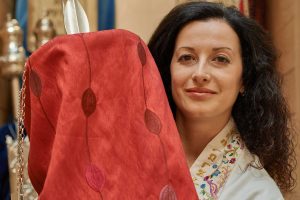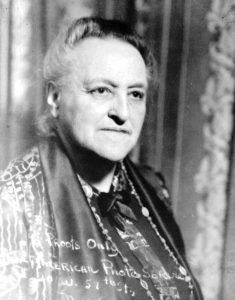The recent festive investiture of new cantor Sveta Kundish in Berlin marks a beginning – and honors the tradition of women in German synagogues…

Cantor Svetlana Kundish
(c) Tobias Barniske
One hundred years ago, Lilian (Lily) Helen Montagu (1873-1963) preached her first sermon at London’s Liberal Jewish Synagogue, “Kinship with God.“ Ten years later, on August 19th, 1928, the British lay minister delivered the first sermon ever given by a woman from the pulpit of a German synagogue, speaking at Berlin’s Reform Temple. “I think there is a pressing need for women to come down from your synagogue galleries and enter into the life of the synagogue,” she urged her audience in Berlin in 1930. Montagu was the driving force behind the World Union for Progressive Judaism, and many Jewish women activists in Germany regarded her as a role model and an inspiration.
Progressive Judaism in Germany had already addressed women’s equality in terms of religious practice in the early 19th century. In 1837, Rabbi Abraham Geiger said: “From now on, let there be no distinction between duties for man and woman, (…) no institution of the public service, either in form or content, which shuts the doors of the temple in the face of women.” The question is why it took nearly a century, from 1837 to 1935 – when Regina Jonas became the first woman to earn the title of rabbi – to achieve that equality. With her ordination in Germany some 80 years ago, another important milestone was reached in Jewish history.
“It was never important to me to be the first; I wish I were the hundred-thousandth.” During her lifetime, Regina Jonas was the one and only woman rabbi. The first women rabbis to be ordained after Jonas were Sally Priesand in 1972 (Reform), Sandy Eisenberg Sasso in 1974 (Reconstructionist), and Amy Eilberg in 1986 (Masorti/Conservative). The first woman to be ordained and actually work in a rabbinical capacity within an orthodox setting is Sara Hurwitz (2009). Today, there are well over a thousand women among the approximately 5,000 rabbis in the nonorthodox movements.

Lily H. Montagu
(c) Liberal Jewish Synagogue London
Making an impact
Women are making an impact on the rabbinate today in all areas of Jewish life, a development that has only come about slowly and with much struggle. Time and time again, women have become pioneers for their gender in new places and professions. When Betty Robbins was appointed as cantor of a Reform congregation in Oceanside, New York in 1955, a spokesman said that there was no religious law, merely a tradition, against women becoming cantors. Twenty years later, Barbara Ostfeld became the first woman to be invested as a female cantor in the U.S., another landmark event.
In Germany, once the cradle of progressive Judaism, the Shoah had cut off the new understanding of women’s roles in religious life that the 1920s had brought. Until the mid-1990s, the entire rabbinate was still deemed a male profession. Only in 1995 was Rabbi Bea Wyler, who had been ordained at the Jewish Theological Seminary in New York, appointed the first woman rabbi in postwar Germany. The first woman ordained in Germany after the Shoah was Rabbi Alina Treiger, a graduate of Abraham Geiger College in Potsdam (2010). Today, there are seven women rabbis among the 29 members of the General Rabbinical Conference of Germany, and recently, Abraham Geiger College invested its third female cantor, Svetlana Kundish. Born in Ukraine and later moving to Israel and Austria, she performs a variety of Jewish music. “A circle has closed,” Kundish says. “Just like my great-grandfather, I stand today on a bimah and lead prayers in the synagogue, and like my grandparents, I sing Yiddish songs.” The soprano serves as cantor of the Jewish Community of Braunschweig, thus becoming a woman pioneer in her profession in the German state of Lower Saxony. ■
